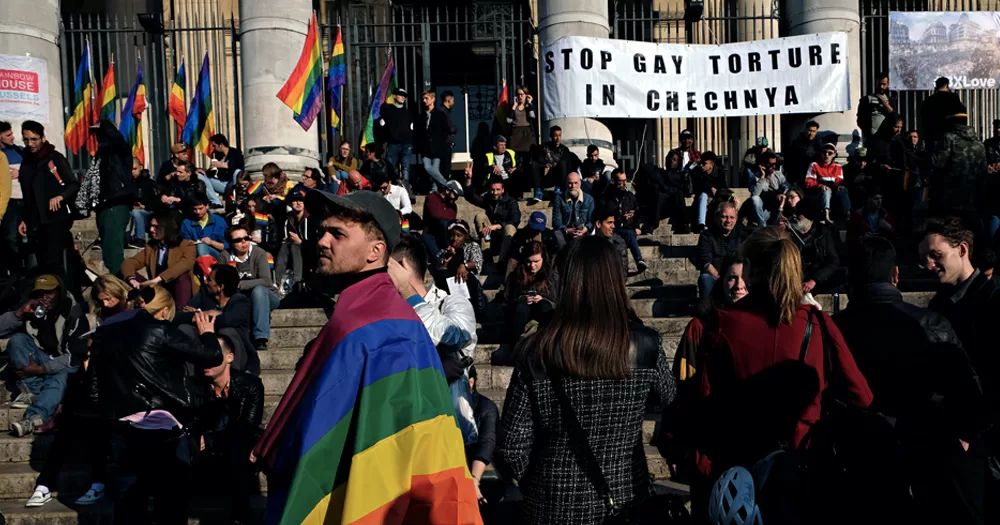On Tuesday, September 12, the European Court of Human Rights (ECtHR) ruled in favour of Maxim Lapunov, the only victim who sought justice after the so-called “anti-gay purge” that took place in Chechnya in 2017. In its ruling, the court stated that Lapunov was “detained and subjected to ill-treatment by State agents,” which “amounted to torture” and was perpetrated “solely on account of his sexual orientation.”
News of the “anti-gay purge” taking place in Chechnya first broke out in 2017, when the newspaper Novaya Gazeta published the first report on the persecution of LGBTQ+ people that was taking place in the Russian federal republic. According to the reports, men suspected of being gay were subjected to abduction, arbitrary detention and torture at the hands of Chechen authorities.
These men were held in unofficial detention facilities, some were made to disappear and others were returned to their families barely alive. Moreover, Chechen authorities exposed them to their families for being gay and even encouraged them to carry out “honour killings”.
As reported at the time, this “anti-gay purge” had been instigated by the President of Chechnya himself, Ramzan Kadyrov. News of what was happening in the Russian federal republic sparked international outrage, with protests taking place all over the world, calling for Russia to investigate and put an end to this persecution.
Other reports of men being detained and tortured by the Chechen authorities because of their presumed sexual orientation also emerged in 2019. Despite this, Russian authorities claimed that they would be unable to investigate this persecution because no victim had been willing to testify because of intimidation by the regime.
With incredible courage, a victim of #Chechnya’s vile 2017 anti-gay purge has told the truth and won his case at the European Court of Human Rights. @astroehlein explains in his Daily Brief today: https://t.co/5l4MZM9Khr pic.twitter.com/tCYlQxL8RM
— Human Rights Watch (@hrw) September 13, 2023
However, one of the victims, Maxim Lapunov, did come forward despite great personal risk. Lapunov, a Russian man who had moved to Chechnya for work, spoke up about how he was unlawfully detained and tortured by Chechen State agents in March 2017 because of his sexual orientation. He recounted being abducted and brought to an unknown location, where he was accused of having come to Chechnya “to seduce Chechen boys” and was then repeatedly beaten until he was “covered in blood”.
He was also forced to watch other victims undergo the same treatment and was made to give up the names of other men with whom he had had relationships. After his sister reported his disappearance, he was released and threatened with retribution if he complained to the authorities.
Despite this, Lapunov provided his testimony to Russian authorities and attempted to cooperate with them, but they still failed to investigate the “anti-gay purge” in Chechnya. Realising that Russia would not conduct any investigation, Lapunov took the case to the European Court of Human Rights.
With the ruling handed out on September 12, the court found that Chechnya had violated Articles 3 and 14 of the European Convention of Human Rights (ECHR), which respectively prohibit torture or inhumane and degrading treatment and discrimination, as well as Article 5, which protects the right to liberty and security.
Moreover, the court concluded that the Russian authorities had failed to conduct a proper investigation of the case and awarded €52,000 in non-pecuniary damages to Lapunov.
© 2023 GCN (Gay Community News). All rights reserved.
Support GCN
GCN is a free, vital resource for Ireland’s LGBTQ+ community since 1988.
GCN is a trading name of National LGBT Federation CLG, a registered charity - Charity Number: 20034580.
GCN relies on the generous support of the community and allies to sustain the crucial work that we do. Producing GCN is costly, and, in an industry which has been hugely impacted by rising costs, we need your support to help sustain and grow this vital resource.
Supporting GCN for as little as €1.99 per month will help us continue our work as Ireland’s free, independent LGBTQ+ media.
